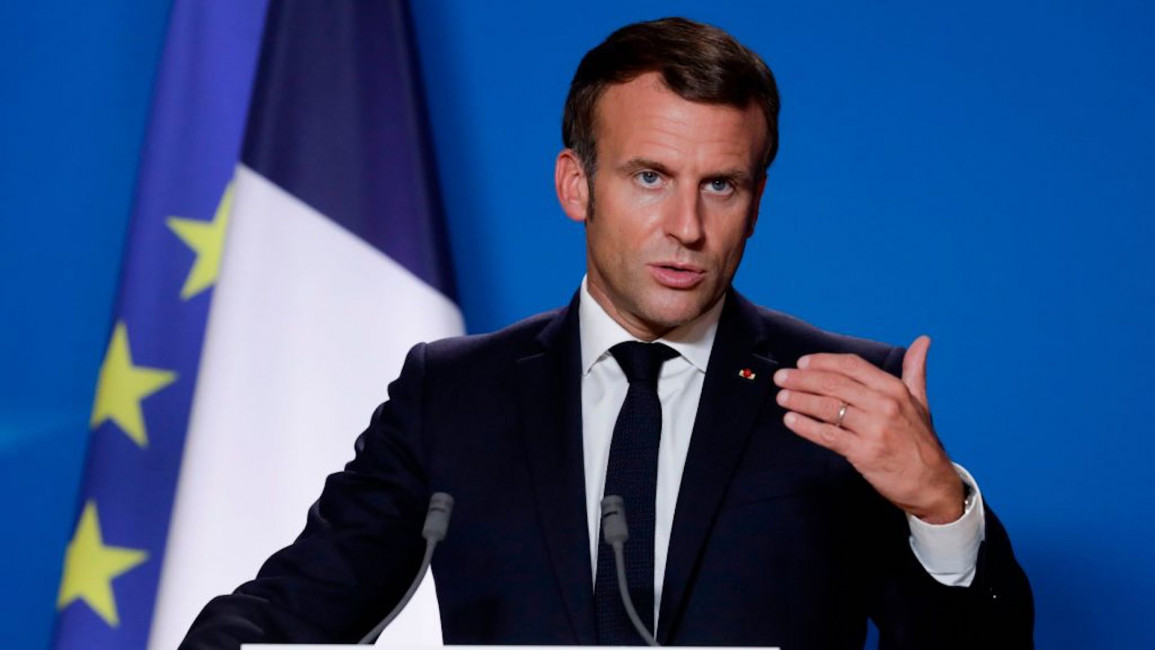Macron demands Turkey explain 'jihadists' in Azerbaijan
"A red line has been crossed, which is unacceptable," Macron said, after talks with EU leaders. "I urge all NATO partners to face up to the behaviour of a NATO member.
"France's response is to ask Turkey for an explanation on this point," he said.
The West and Russia renewed calls to halt several days of fighting over the disputed Nagorno Karabakh region that has left more than 130 dead.
In a joint appeal, Russian President Vladimir Putin, US President Donald Trump and Macron urged the two sides to return to negotiations aimed at resolving their longstanding territorial dispute.
The French leader said in a separate statement that Syrian jihadist militants had joined the fighting in Karabakh via Turkey, describing the deployment as a "serious new fact, which changes the situation".
Armenian Prime Minister Nikol Pashinyan and Azerbaijani leader Ilham Aliyev have both rejected the idea of holding talks.
|
Russia suggested it was making progress in diplomatic efforts with Turkey, a firm supporter of Azerbaijan in the conflict.
It said Foreign Minister Sergei Lavrov and Turkish counterpart Mevlut Cavusoglu had confirmed readiness for "close coordination" to stabilise the situation.
In Martuni, a small town in Karabakh around 25 kilometres from the front line, residents took refuge in cellars as heavy shelling by Azerbaijan killed four civilians and wounded 11.
Artak Aloyan, a 54-year-old construction worker sheltering in his basement with an elderly neighbour, vowed to stay in Karabakh despite the worst clashes the contested region has seen for years.
"I built this house with my own hands. I will not go anywhere, that's that," he told AFP after a Grad rocket attack. "I will die here in the last battle."
Journalists including a team from AFP were interviewing local residents when the shelling in Martuni occurred, seriously injuring a reporter and photographer working for the French daily Le Monde.
The French journalists underwent surgery in the town's hospital and Macron said France was ready to airlift them out.
'Crushing strikes'
The rival Caucasus nations have been locked in a bitter stalemate over Karabakh since the collapse of the Soviet Union when the ethnic Armenian region broke away from Azerbaijan.
The fiercest clashes between Armenian and Azerbaijani forces in years ignited Sunday and confirmed deaths reached 136 as fighting raged for a fifth day.
The Armenian defence ministry said fighting had "intensified" and its troops had repelled Azerbaijani attacks, downing helicopters and destroying drones and armoured vehicles.
It said Thursday evening that Azerbaijani forces had fired on two villages inside Armenia, close to Karabakh, killing one civilian.
Armenian Deputy Prime Minister Tigran Avinyan said on Facebook that 1,280 Azerbaijani troops had been killed and 2,700 wounded since Sunday, as both sides have made claims of heavy casualties inflicted on their opponent.
In turn, Azerbaijan's defence ministry said its forces had carried out "crushing artillery strikes" on Armenian forces.
Azerbaijan denied claims by Yerevan that one of its helicopters was shot down and had crashed in Iran.
The two sides have accused each other of shelling civilian areas and ignored repeated calls from international leaders to halt the conflict that threatens to draw in regional powers Turkey and Russia.
Putin, Macron and Trump called for an "immediate cessation of hostilities" in their statement Thursday and urged the warring sides to commit to talks to resolve the fighting.
"We also call on the leaders of Armenia and Azerbaijan to commit without delay to resuming substantive negotiations," said the leaders, whose countries are the co-chairs of the OSCE Minsk group that has sought a solution to the conflict since the 1990s.
'Foreign fighters'
Yerevan is in a military alliance of ex-Soviet countries led by Moscow and has accused Turkey of dispatching mercenaries from northern Syria to bolster Azerbaijan's forces in the Karabakh conflict.
|
It also claimed earlier this week that a Turkish F-16 flying in support of Baku's forces had downed an Armenian SU-25 warplane, but Ankara and Baku denied the claim.
Pashinyan reiterated claims that mercenaries had joined the conflict, saying Azerbaijan and Turkey were fighting "with the help and involvement of foreign terrorist fighters."
"This terrorism equally threatens the United States, Iran, Russia, and France," he added.
Azerbaijan's ally, Turkish President Tayyip Erdogan, has signalled his country's full backing for Baku's military and on Thursday called for Armenian troops to leave Karabakh.
"The way for a lasting ceasefire in this region depends on Armenians' withdrawal from every span of Azerbaijani territory," Erdogan said.
A Turkish diplomatic source told Anadolu state news agency that Turkish foreign minister Cavusoglu told Russia's Lavrov there was no point in having a ceasefire without Armenia ending its "occupation".
Civilian casualties
Armenia has recorded the deaths of 104 soldiers and 13 civilians. Azerbaijan has not reported any military casualties but said 19 civilians were killed after Armenian shelling.
Though Azerbaijan has not admitted to any deaths, an AFP journalist in the country's south witnessed the funeral of a soldier killed in the clashes.
Karabakh's declaration of independence from Azerbaijan sparked a war in the early 1990s that claimed 30,000 lives, but it is still not recognised as independent by any country, including Armenia.
Armenia and Karabakh declared martial law and military mobilisation Sunday, while Azerbaijan imposed military rule and a curfew in large cities.
Talks to resolve the conflict have largely stalled since a 1994 ceasefire agreement.
In a separate development, Israel said it regretted Armenia's decision to recall the Armenian ambassador to Israel for consultations. Israel is accused by Armenia of selling arms to Azerbaijan which are used in the conflict.
Follow us on Facebook, Twitter and Instagram to stay connected


![President Pezeshkian has denounced Israel's attacks on Lebanon [Getty]](/sites/default/files/styles/image_684x385/public/2173482924.jpeg?h=a5f2f23a&itok=q3evVtko)



 Follow the Middle East's top stories in English at The New Arab on Google News
Follow the Middle East's top stories in English at The New Arab on Google News


